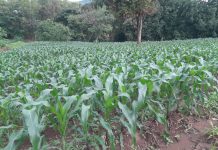Africa-Press – Malawi. There is hope that farmers in Malawi and four other African countries would no longer be losing crops to the Fall Armyworm following research that has culminated in the identification of natural ways of dealing with the worms.
HAILU—There were gaps in communitiesTechnical lead for International Centre for Insect Physiology and Ecology (ICIPE) Girma Hailu revealed this on Tuesday when representatives from Kenya, Malawi, Zambia, Zimbabwe and Ethiopia shared the research findings in Mangochi.
The research was funded by the United States Agency for International Development and was aimed at Reinforcing and Expanding Community-based Fall Armyworm Monitoring, Forecasting for Early Warning and Timely Management to sustain food security and improve livelihoods for vulnerable communities.
“We have established that there were gaps in how communities were dealing with the Fall Armyworm in most African countries. In most instances, chemical control was not working, which was resulting in farmers losing their crops.
“Through this project, we have managed to get some crops which farmers can grow alongside maize. These crops can help reduce the impact of the Fall Armyworm by fighting them in a natural way,” he said.
Hailu said the project had recommended that some of the findings and recommendations be adopted by participating countries after approval from local institutions.
For over a decade, the Fall Armyworm has been negatively impacting maize production in the country.
On his part, senior lecturer at Lilongwe University of Agriculture and Natural Resources Trust Donga said, once approved by the government, new ways of controlling the Fall Armyworm would be cost effective on the side of the farmer.
Donga said the technology would also help to improve yield because there were studies which indicated that crop production was being affected after being attacked by the Fall Armyworm.
“This is a very good initiative, such that it would go a long way in helping stakeholders manage pests and insects that have been affecting our farmers. We also have some plants which were approved at Luanar as pest control measures. These are already in use,” she said.
For More News And Analysis About Malawi Follow Africa-Press






